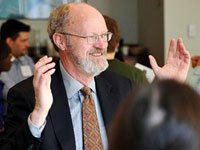Nobel laureate in chemistry urges students to seek their passion in research

Nudge from a nobelist
On March 2, 2010, Robert Grubbs, the 2005 Nobel laureate in chemistry, visited the University of Minnesota's Twin Cities campus.
Generating a big reaction
In a public lecture that morning, Grubbs spoke about how his early interest in science was sparked by the launch of Sputnik in 1958 and how he became involved in research as an undergraduate.
Grubbs earned his prize for researching and developing a chemical reaction called olefin metathesis and the catalyst for the reaction that bears his name. The reaction is used to generate a variety of industrial chemicals from olefins, which are components of crude oil.
He also told how the metathesis reaction started as an industrial afterthought that slowly grew into the practical and useful reaction it is today. He emphasized the applications of his work; for example, the reaction has been used to produce pheromones that help protect crops from insects and to make new lightweight plastics.
Up close and personal
Having studied and performed the Grubbs reaction in my chemistry coursework, I was more than excited about the prospect of meeting the man behind the metathesis. That afternoon I was fortunate enough to be part of a small group of students who met with Grubbs for a question-and-answer session.
Grubbs was in good spirits as he fielded questions about the technical aspects of his research and about winning the Nobel Prize. He also gave advice on conducting research as an undergraduate and finding the right field of study.
Grubbs told how some of his best students suddenly lost interest in chemistry, even after they had earned advanced degrees. He said that undergraduate research is a valuable experience that exposes students to the graduate school environment, which can help avoid problems of uninterested graduate students. Grubbs said his job as a professor is to give undergraduates a really good experience that will allow them to decide if graduate school is right for them.
Apart from that, it is up to undergraduates to take advantage of the experience and to be motivated and excited about research.
"Demonstrate that you're really interested," he said. "That will help other people know that you're excited about research."
Finding the right mentor is another piece of the puzzle. Grubbs spoke of his experience as an undergraduate, where he planned on studying agriculture. He wasn't even thinking about chemistry until he met his undergraduate research adviser, who got him actively involved in research and helped him along the way to graduate school.
Being motivated to research is important, but finding the right direction after school is an entirely different problem. Grubbs emphasized the necessity of finding an area to research. He said that his field was small when he started out, but he found a good opportunity and it eventually paid off.
"Never back off from an opportunity," he said. "Find the best one and follow it, and that leads to the best places in life."
- - -
Grubbs' visit was sponsored by the Honeywell-Nobel Initiative, which connects university students with recipients of the world's most prestigious award. William Wolf is a student in the University of Minnesota's Institute of Technology.
